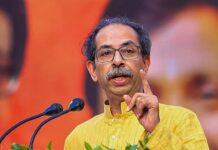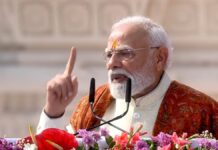X: @the_news_21
The upcoming Rajya Sabha election, scheduled for February 27, aims to fill 56 vacant seats in the Upper House of the Indian Parliament. This electoral necessity arises as the tenure of 56 incumbent members, including notable figures like former Prime Minister Manmohan Singh and BJP chief JP Nadda, is set to conclude in April. Among the vacant seats are those held by nine Union ministers, such as Railway Minister Ashwini Vaishnaw, Health Minister Mansukh Mandaviya, Education Minister Dharmendra Pradhan, and Environment Minister Bhupendra Yadav.
Selection Process of Rajya Sabha MPs
Unlike the Lok Sabha, where members serve for five years, Rajya Sabha members have a tenure of six years. Every two years, one-third of the members retire, and new members are elected to fill their seats. The election process involves elected members of the State Legislative Assemblies (MLAs) and Union territories, who vote through a system called proportional representation by means of single transferable vote (STV).
Requirements to Become a Rajya Sabha MP
To qualify as a Rajya Sabha member, an individual must be a citizen of India, at least 30 years of age, and meet any other qualifications prescribed by law.
Responsibilities of Rajya Sabha MPs
- Legislative Responsibility: Rajya Sabha members play a pivotal role in the enactment of laws. No bill can become law unless it is passed by the Upper House. In case of a deadlock between the two Houses, a joint sitting is convened to resolve the impasse.
- Electoral Responsibility: Members participate in the election of the President and Vice President of India. However, nominated MPs do not vote in the election of the President of India but can vote in the election of the Vice President.
- Power of the Purse Responsibility: MPs oversee government revenues and expenditures, approving budgets proposed by the government. Ministers who are also members of Parliament have additional executive responsibilities compared to those who are not in the Council of Ministers.
Special Powers of Rajya Sabha
- Empowerment to make laws in respect of any matter enumerated in the State List in the national interest by adopting a resolution.
- Authority to create or dissolve All India Services based on national interest, with a two-thirds majority resolution.
As India gears up for these crucial elections, understanding the selection process, powers, and responsibilities of Rajya Sabha MPs is essential for ensuring effective governance and representation in the Upper House of Parliament.







Individuals had been thought-about dependent if they offered with three or more signs.
In subsequent analyses, the total variety of AAS dependence signs were summed to approximate severity of dependence.
A retrospective chart evaluation was performed to judge the security of
cervical ESIs performed using a catheter-based approach.
Medical data were reviewed for all patients who underwent cervical epidural
injections with interlaminar method with catheter advancement to the targeted cervical pathology.
A retrospective evaluation was performed of 9 patients
who underwent cervical ESIs using a catheter-based technique.
Under fluoroscopic guidance, the epidural house was accessed with a touhy needle, and a versatile catheter was advanced
to the level of pathology for treatment administration.
The firm additionally does not check on animals, showing a powerful dedication to moral production. In this Soothen Ache Reduction Cream evaluation, you’ll study what’s contained in the cream, the means it works,
and whether or not it might lastly help you transfer with less or no pain. Claritin is an antihistamine used to treat the symptoms of
allergic reactions, such as sneezing, watery …
Zyrtec (cetirizine) is used to treat allergy signs
corresponding to sneezing, itching, watery eyes, or
… It is unhappy how physicians turn out to be accomplices of the pharmaceutical
industry to ruin American’s well being…
And after making an attempt drugs, creams, and heat packs that
don’t do a lot to ease the ache, you can start
to really feel pissed off. Celebrex is a nonsteroidal anti-inflammatory drug used to treat ache or inflammation. The potencies of corticosteroids range
extensively, with artificial compounds usually retaining greater antiinflammatory efficiency and weaker salt-retaining
properties; these potencies are summarized in the Desk.
The opinions expressed in WebMD User-generated content areas like communities, reviews, scores, or blogs are solely
those of the User, who could or might not have medical or scientific
training.
Typically, stacking Oral Testosterone Steroids together results in a rise in unwanted effects, corresponding to further elevations in ldl cholesterol and
liver enzyme activity. Nevertheless, in Deca Durabolin’s case, stacking it with different steroids can truly help to mitigate unfavorable
results relating to sexual health due to elevated androgenicity.
First, though detailed hematological findings have been simple
to extract, the variety of enrolled sufferers was small; subsequently, the pattern dimension was
not giant enough to draw reliable conclusions.
All sufferers had been monitored throughout and after the process for any
complications. Subsequently, Winstrol typically isn’t an appropriate steroid
for girls in the event that they wish to stay wanting and sounding like women. The only exception to that is if very small doses of Winstrol are taken. Nevertheless,
such a protocol is unlikely to surpass the results of taking more female-friendly steroids, corresponding to Anavar.
If I knew Id have to attend almost a month for my package deal anyway I would have saved money choosing a world warehouse.
On top of being actually been able to watch its journey
as an alternative of being left in the dark. When you understand
what unwanted facet effects are potential, you’ll find a way to take steps to manage
their influence. Thus, trenbolone will add more lean muscle than Deca Durabolin; nonetheless,
weight acquire on the finish of a cycle could also be similar due to Deca causing fluid
retention and trenbolone enhancing fat loss (10).
However, research and our personal findings counsel that Deca Durabolin is able to inflicting masculinization in ladies, even in small dosages, when taken continuously over the long term.
Studies indicate that Deca Durabolin is mostly well-tolerated by ladies when taken in dosages of
a hundred mg (6), administered each other week for 12 weeks
(thus translating as 50 mg/week).
When signs persist, cervical epidural steroid
injections (ESIs) are a commonly employed interventional choice aimed at reducing inflammation and assuaging nerve root irritation. The time period steroid applies to a broad range of molecules with various physiological
effects. More particularly, corticosteroids are a class of chemicals encompassing
each laboratory-synthesized and naturally produced hormones.
Glucocorticoids, generally, regulate metabolism and inflammation; mineralocorticoids regulate sodium and water levels.
UC was diagnosed in accordance with established scientific, endoscopic,
and histological diagnostic criteria [10]. Sufferers with inflammatory bowel disease
(IBD) who weren’t diagnosed with UC however were recognized with
indeterminate colitis or unclassified IBD had been excluded.
Patients with a clinical activity index (CAI) ≤ 4 were excluded
to focus on these with an lively disease. To consider the efficacy of VDZ
remedy, sufferers receiving ongoing prednisolone (PSL)
treatment have been additionally excluded. The major endpoint of this study was the continuation of treatment with VDZ + speedy
PSL (rPSL) induction. Corticosteroid medicines are used to deal with rheumatoid arthritis, inflammatory bowel disease (IBD), asthma, allergy symptoms and
a lot of different conditions. They also are used to forestall organ rejection in transplant
recipients.
Adjustments in the clinical exercise index (CAI), blood check results, and the elements
affecting VDZ fee and continuity were investigated. Sufferers who obtained at least 20 mg
PSL inside 1 week of VDZ induction had been included in the VDZ + speedy PSL induction (VDZ + rPSL)
group, and the remaining have been assigned to the
non-VDZ + rPSL group. In real-world clinical settings, the scientific efficacy of
vedolizumab (VDZ) in sufferers with ulcerative colitis (UC) stays unclear.
In this examine, we aimed to evaluate the efficacy of prednisolone (PSL)–VDZ mixture therapy in patients with UC.
Moreover, for the rationale that epidural space turns into narrower at greater levels – many physicians solely carry out cervical ESIs on the C7/T1 interspace for safety concerns.
Once the catheter was positioned on the desired degree, distinction dye was injected through the catheter to substantiate appropriate spread throughout the epidural
house and to verify that there was no intrathecal or intravascular uptake.
In such a highly charged matter, solely through meticulous examination can true discernment between hypothesis and reality be achieved.
To this end, correct verification of information stands paramount in setting apart fiction from actuality.
As the behemoth sport of strongman has not been untouched by the shadow of PEDs, every discussion surrounding Brian Shaw and his alleged use of such substances ought to be approached with both
skepticism and an open thoughts. The weight of evidence should in the end information opinions
and forge a transparent path by way of the cloud of conjecture.
In the realm of strongman athletics, Brian Shaw stands
as a towering figure, his achievements in power competitions commanding respect and admiration. Yet, whispers of Brian Shaw steroid use persist in the competitive landscape,
clouding the public’s perception of his storied profession.
Steroids, being hormones, are usually used based on individual
sensitivity and response, as one individual may react extra strongly to
a certain steroid than another. To enjoy the benefits of steroids with minimal drawbacks, it’s crucial to know exactly what you’re taking and the
explanations behind it. Steroid injections are
nonetheless simply injections, that means injecting steroids feels just
the identical as other injections. For example, legal steroids
for women (https://leristrutturazioni.it/art/acquistare_clenbuterolo_1.html) injections might be more painful whether it is
injected into the bicep muscle as opposed to the thigh.
The use of steroids with other medication can lead to unplanned issues or diminish the drugs’ effectiveness.
The addition of creatine to high-intensity interval coaching had
no effect on body composition in recreationally active females [89].
In addition, the consequences of creatine supplementation during
resistance coaching overreaching had no impact on fats mass [70].
Furthermore, in a group of wholesome recreational male bodybuilders, 5 g/day of creatine consumed
either pre- or post-training had no effect on fat mass [90].
In other short-terms research lasting 6-8 weeks, there were no changes
in fat mass from creatine supplementation. Becque et al. [91] found no adjustments in fat mass after six weeks of supplementation plus resistance coaching.
In another 6-week investigation, no vital variations in fat mass or percentage body fats were noticed after creatine supplementation [42].
Moreover, creatine supplementation during
an 8-week rugby union soccer season additionally had no effect on fat mass [92].
The most effective way to avoid antagonistic reactions is to
use steroids responsibly and correctly. Abiding by the beneficial dosages and cycle lengths tailored to your particular person wants and goals is essential in stopping adverse reactions.
Excessive doses over prolonged periods significantly diminish the effectiveness of any preventive measures,
underscoring the importance of protected steroid utilization. DHT steroids
typically induce fewer opposed reactions in comparison to testosterone derivatives, primarily attributed to their absence of estrogenic effects.
Consequently, antagonistic reactions are predominantly
observed in people who’re sensitive to androgenic results.
Pharmaceutical scientists have developed various steroids by modifying testosterone molecules, adjusting the
stability between anabolic and androgenic effects.
Topical steroid cream could be applied to the affected space directly to target
the inflammation and ease these signs, to give the much-needed relief.
General, Derek believes athletes with access and privileges to drug-testing services could feasibly beat a
test more simply. With varying governing
bodies that oversee drugs similar to USADA and WADA, Derek of MPMD underlined the convenience of defeating a given take a look at.
In five of these research [67–71], free testosterone,
which the physique uses to produce DHT, was also measured and
no will increase have been discovered. Creatine (methylguanidine-acetic acid) is endogenously
shaped from reactions involving the amino acids arginine, glycine and methionine within the kidneys and liver [1].
Exogenously, creatine is primarily consumed
from meat and/or as a dietary complement. As of September 1, 2020,
the paper has been seen 179,000 occasions and cited one
hundred occasions (according to Net of Science).
Furthermore, Altmetric information signifies that the paper has been mentioned in 19 news shops,
four blogs, 492 tweets, 54 Facebook pages, and been uploaded 69
times in video posts. Steroid injections can be used to
treat a spread of circumstances, including rheumatoid arthritis, osteoarthritis,
and tendonitis. In some instances, steroid injections could also be used to treat
respiratory situations, such as asthma.
Thanks to misrepresentations in the media and misconceptions fueled by rumour, many typically confuse medically supervised testosterone therapy with the controversial world of steroid abuse.
Although barely much less potent than Clomid, Tamoxifen is another SERM useful for PCT, especially when 19-Nors aren’t a part of the cycle.
Nolvadex is normally taken at 40mg every day for the first two
weeks, then 20mg daily for the remaining two weeks of a four-week PCT.
Given the distinct and extra delicate nature of the feminine physique, lower
steroid dosages and shorter cycle durations are really helpful.
This approach not only helps keep hormonal stability but additionally
is cost-effective, achieving similar outcomes with much less usage in comparability with men.
In this text, we’ll delve into the science behind steroid injections, their impact on body
weight, and the surprising link between the 2. To date, 12 other
research have investigated the consequences of creatine supplementation (i.e.
doses starting from 3-25 g/day for six days to 12 weeks) on testosterone.
Two research reported small, physiologically insignificant will increase in total testosterone
after six and 7 days of supplementation [65, 66], whereas the
remaining ten research reported no change in testosterone concentrations.
where can i get generic clomiphene price clomid price at clicks buying clomiphene no prescription cost of cheap clomiphene without insurance clomiphene pills price at clicks can you buy cheap clomid without insurance buying clomiphene pill
This is the description of glad I get high on reading.
The vividness in this piece is exceptional.
order zithromax 250mg pills – buy generic zithromax 500mg buy flagyl 200mg without prescription
buy generic rybelsus 14mg – buy rybelsus buy cyproheptadine medication
buy domperidone 10mg generic – sumycin 500mg brand flexeril usa
buy cheap generic amoxicillin – buy generic ipratropium 100mcg ipratropium 100 mcg without prescription
augmentin pills – atbioinfo.com order ampicillin online cheap
esomeprazole online – https://anexamate.com/ brand esomeprazole
generic coumadin 5mg – https://coumamide.com/ hyzaar cost
meloxicam generic – https://moboxsin.com/ buy mobic without prescription
prednisone 5mg sale – https://apreplson.com/ order deltasone 20mg sale
buy ed medication online – buy ed pills usa medicine for impotence
escitalopram 20mg brand – on this site order escitalopram 10mg online
cenforce oral – https://cenforcers.com/# cenforce 50mg tablet
purchase cialis online – https://ciltadgn.com/ generic cialis
can cialis cause high blood pressure – https://strongtadafl.com/# cialis tadalafil 20 mg
buy ranitidine online cheap – https://aranitidine.com/# order generic zantac
order viagra with mastercard – discount viagra for sale order viagra from uk
More posts like this would force the blogosphere more useful. site
I couldn’t resist commenting. Warmly written! https://buyfastonl.com/isotretinoin.html
Thanks for sharing. It’s top quality. https://ursxdol.com/azithromycin-pill-online/
Good blog you procure here.. It’s hard to espy high worth article like yours these days. I truly appreciate individuals like you! Go through mindfulness!! https://prohnrg.com/product/diltiazem-online/
More delight pieces like this would make the интернет better. acheter lasix 40 en france paiement securise
With thanks. Loads of conception! https://ondactone.com/spironolactone/
This is the gentle of criticism I in fact appreciate.
buy methotrexate
With thanks. Loads of expertise! http://www.softwizard.ru/en/redirect-url?redirect_url=https://schoolido.lu/user/adip/
Facts blog you procure here.. It’s intricate to espy great status writing like yours these days. I truly comprehend individuals like you! Take guardianship!! http://web.symbol.rs/forum/member.php?action=profile&uid=1170908
order xenical without prescription – https://asacostat.com/ buy xenical for sale
This is the big-hearted of literature I in fact appreciate. https://www.forum-joyingauto.com/member.php?action=profile&uid=49500
where can you buy anabolic steroids
References:
https://atavi.com/share/xhm1inz1pms72
You can keep yourself and your dearest by way of being heedful when buying pharmaceutical online. Some druggist’s websites function legally and sell convenience, reclusion, bring in savings and safeguards over the extent of purchasing medicines. buy in TerbinaPharmacy https://terbinafines.com/product/nolvadex.html nolvadex
This is a theme which is in to my callousness… Diverse thanks! Quite where can I upon the contact details for questions? TerbinaPharmacy
This is the kind of scribble literary works I in fact appreciate.
搭载智能站群程序,自动化搭建与管理,为SEO项目提供核心驱动力。站群程序
Đến với J88, bạn sẽ được trải nghiệm dịch vụ cá cược chuyên nghiệp cùng hàng ngàn sự kiện khuyến mãi độc quyền.
Đến với J88, bạn sẽ được trải nghiệm dịch vụ cá cược chuyên nghiệp cùng hàng ngàn sự kiện khuyến mãi độc quyền.
Tham gia cộng đồng game thủ tại Go88 để trải nghiệm các trò chơi bài, poker phổ biến nhất hiện nay.